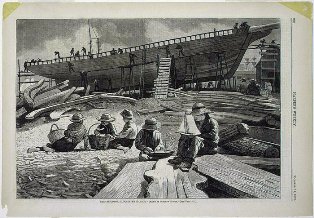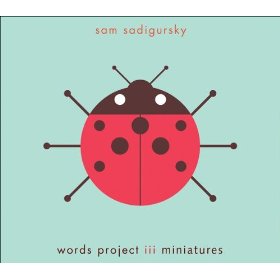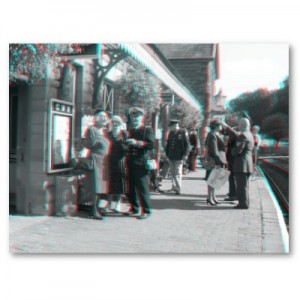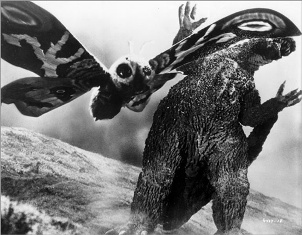I’ve committed to writing a poem per day in April as part of NaPoWriMo (National Poetry Writing Month). Watch this space for the poems, and why not try it yourself? You can click on the image above for details or visit readwritepoem.org.
Leave a CommentJason Crane Posts
Listen to this poem using the player above.
This poem is the third in a series of pieces inspired by bass clarinetist Thomas Savy’s new CD, French Suite (Plus Loin Music, 2009). This particular poem came from his composition “Stones.” You can learn more about Thomas Savy at his MySpace page. I’ll be posting more poems in this series in the coming days. You can also read and listen to the first and second poems in this series.

Stones
like the ones
my grandfather
painted flowers
on, found near
the water
where the pilgrims
landed, stepping
onto the big stone
and calling out
thanks to their god
Listen to this poem using the player above.
This poem is the second in a series of pieces inspired by bass clarinetist Thomas Savy’s new CD, French Suite (Plus Loin Music, 2009). This particular poem came from his composition “My Big Apple.” You can learn more about Thomas Savy at his MySpace page. I’ll be posting more poems in this series in the coming days. You can also read and listen to the first poem in this series.

My Big Apple
every tune about New York
rushes forward this way
even the ballads
the kinetic energy of the city
is just too strong to resist
and before you know it
a laconic melody about
the Hudson has turned
that river into the Mississippi
at flood stage
the skyscrapers floating by
at 45 degrees to the horizon
businessmen doing the
backstroke off the Battery
Listen to this poem using the player above.
This poem is the first in a series of pieces inspired by bass clarinetist Thomas Savy’s new CD, French Suite (Plus Loin Music, 2009). This particular poem came from listening to his performance of John Coltrane’s “Lonnie’s Lament.” You can learn more about Thomas Savy at his MySpace page. I’ll be posting more poems in this series in the coming days.

the bass clarinet
reaches down, scoops
out your intestines
causes your brow
to furrow, your eyes
to narrow then shut
lamentation, an old
fashioned word
from before these sounds
existed, before this
Frenchman was born
John William burned
his lament onto the wax
as he had inscribed it
onto the paper
black ink to red fire
Listen to this poem using the player above.
The quotation that begins this poem comes from the “Excerpts From Oliver Charming’s Diary” section of Jack Spicer’s “Unvert Manifesto.” I read that line and couldn’t stop thinking about it.

Rain
(for Jack Spicer)
“there is a morning when it rains
in the corner of everybody’s bedroomâ€
Jack said, eyebrow raised
I never knew whether he was joking
or whether his little exclamations
were more like Buddhist koans
rhetorical devices that were intended
to get the brain juices flowing
opening the mind for something or other
“better give me that umbrella, thenâ€
I answered, raising my own eyebrow
trying to fight fire with fire
but Jack wasn’t amused
he just turned away in disgust
and opened his well-thumbed journal
I felt like a fool, a novice
I rose to go,
witless and small
“don’t leave,†Jack said, “listenâ€
he put a finger to his lips
I held my breath, concentrating
and there it was, in the corner
of Jack’s room
drip, drip, drip, drip
Listen to this poem using the player above.
My friend Matt and I found an unaccompanied dog while we were walking to lunch yesterday. His tag told us that his name was Zephyr and that he lived a few blocks away. We took him home.

Photo by Matt Leon
Returning Zephyr
everyone just
wants to go home
curled up
on the rug
in front of the fire
weightless
he was there
on the sidewalk
unattended, unafraid
you’ve felt that way, too
still, though
we felt we should
take him home
someone must be
missing him
calling his name
first warm week
here he was
escaped
still, though
we felt we should
take him home
why wasn’t someone
out looking?
no one answered
the phone, ringing
no one answered
the bell, ringing
then she was there
surprised
completely unaware
that he was missing
still, though
we left him there
home
* * *
I think
he would have
been just as happy
to come with us
Listen to this poem using the player above.

Crossing
5 fingers
5,000 lbs of metal
she knows their names
her legs ache on the pavement
she herds them across
shortened crook
5 lbs of metal
5 fingers
Listen to this poem using the player above.

From the Winslow Homer section of the National Gallery
Building The Boat
1.
in the beginning, it was obvious
they were building the boat to flee
resources were scarce
so they were meticulous in the
placement of each plank and the
sewing of each stitch in the sailcloth
carefully they provisioned the craft
and chose only such crew as wouldn’t
miss the homeland, having
no kin to leave behind
the boat was nearly complete
when the first earthquake hit
destroying most of the houses
in the center of town
that afternoon they dismantled the boat
using its planks to build houses
and covering the windows and doors
with the sailcloth to keep out the wind
in time, they sawed new wood for planks
sewed new sails and built a second boat
2.
no one saw the attack coming
certainly relations with the neighboring village
had been strained of late, but the dawn slaughter
of so many innocents startled even
the most cynical among them
fortifications were built from the planks
and uniforms from the sailcloth
they turned away from the surf
and waited for the next wave
behind the barricades
this time the boat-building took longer
there were fewer of them than before
and they had to range farther to get the wood
most of which they gathered at night
when it was safe — or at least safer —
to move beyond the town’s boundaries
3.
by the next autumn they’d finished
this hull was less glorious than the first
or even the second, having been built
from what wood was left
it was seaworthy, though,
standing in the harbor
waiting for those lucky enough
to have berths upon it
the crew had nearly finished loading the hold
when an argument started between the captain
and the chief shareholder
about the planned destination
one said west, one said south
and no entreaties by third parties
could convince either to relent
life went on much as before, and
the fully laden boat rocked on the tide
4.
the submarine nosed toward the wreckage
disturbing the fish who swam between the planks
through the sand kicked up by the sub’s propellers
the doorway to the hold was just visible
it was through this space that the divers slipped
sliding past a hang-hinged door, beyond
the reach of the sub’s light
the divers switched on their flashlights
to reveal row upon row of unopened boxes,
casks and barrels, all neatly tied, waiting
I just found out that the audio version of “Eating Godzilla” was accepted for the upcoming “New Classics” issue of qarrtsiluni. That issue will come out from May to June, with new work posted each day. Watch this space for updates, and thanks, qarrtsiluni!
UPDATE: When I got home today, there was an acceptance letter from Blue Collar Review. They’ll be publishing “Lillian Dupree & The Ballad of Frenchman Street” in an upcoming issue.
That’s two in one day after never having any success with individual poems before. Huzzah!
Leave a Comment![]()
thethe poetry blog has a beautiful piece today from Sarah V. Schweig. You should go read it:
Leave a Comment
Show #150! Crazy, ain’t it?
Multi-instrumentalist Sadigursky just released Words Project III: Miniatures (New Amsterdam, 2010), the third in his series of releases combining contemporary poetry with improvised and through-composed music. In this interview, Sadigursky talks about his decision to use poems as an inspiration for composition; which texts lend themselves to his work and why; and what the various vocalists on his albums bring to the music. Learn more at samsadigursky.com.
LISTEN: The Jazz Session #150: Sam Sadigursky
If you’d like to buy this album, you can support The Jazz Session by purchasing it via the link below:
2 CommentsSina Queyras, poet and blogger at Harriet, the Poetry Foundation blog, wrote an interesting post on the modern sonnet. In it, she mentions this erasure poem by Jen Bervin, from her book Nets:
When I have seen by Time’s fell hand defaced
The rich proud cost of outworn buried age;
When sometime lofty towers I see down-razed,
And brass eternal slave to mortal rage;
When I have seen the hungry ocean gain
Advantage on the kingdom of the shore,
And the firm soil win of the watery main,
Increasing store with loss and loss with store;
When I have seen such interchange of state,
Or state itself confounded to decay;
Ruin hath taught me thus to ruminate
That Time will come and take my love away.
This thought is as a death which cannot choose
But weep to have that which it fears to lose.
Wow. You can find out more at jenbervin.com, and here’s a link to Bervin’s book:
Leave a CommentListen to this poem using the player above.

Blackout
during the war he rode the English trains
asking strangers to wake him at his stop
they never did, and he’d find himself lost
in the blacked-out countryside
worried that the Brits would find him
and think he was a German spy
“They’d shoot ya,” he told me
holding on to the bar in the subway
and leaning against his wife
“My Ro,” he called her
they’d just been to the opera
to see Atilla, and now here he was navigating
the depths of this city, trying to
find the next connection and looking for help
to yet another stranger on a train
I grasped his hand as I led his Ro and him
to the shuttle for Grand Central
this time all the lights were on,
and no shots were fired
Listen to this poem using the player above. The music is by a friend who prefers not to be named. The laughter is by Bernie and John.

Eating Godzilla
for some reason, we started with the tail
you’d think that would be the toughest part
but after we’d sliced away the scales
the flesh was surprisingly tender
and no, it didn’t like taste like chicken
well, maybe a little
but it also had that metallic
just-out-of-the-microwave aftertaste
probably from the lingering effects of the radiation
Kazuhiro had insisted on serving side dishes
despite our obvious inability to finish
the great green lizard in one sitting
so we’d sautéed Mothra in a sesame sauce
and served him (her? it?) in lovely
sculpted bowls that fit perfectly in the hand
I’d suggested also eating Raymond Burr
just for old times’ sake
but by this time he was more fat than meat
and who can be bothered to pare all that away
just for a few grizzled bits of TV lawyer?
anyway, after the tail was finished we
cracked open Godzilla’s skull to get at
what we thought would be
the salty brain encased within
imagine our surprise, then, when
the skull turned out to contain
thousands of Pez candies
in a variety of fruity colors
Iwai-kun suggested handing them out to the children
who’d naturally gathered ’round us
for a look at the sundered source
of their nightmares
you should have seen the smiles
on their faces as he
reached his hands into the skull
and drew forth the rainbow
of sugary delights
he tossed the Pez out like Mardi Gras beads
and the kids scrummaged for them, squealing
Listen to this poem using the player above.

Tea Ceremony Hurts Yours Legs
at 17, I studied the ancient art of tea ceremony
with my final host-mother
and a teacher who seemed middle-aged
but may have been just slightly older than I am now
I’m not sure about the sensei,
but one thing I do know is
tea ceremony hurts your legs
the insidious thing is that you
don’t even notice it at first
you’re too focused on
placing the bowl just so
the ladle along the crook
between your thumb and index finger
the sugary snacks on a piece
of pristine rice paper
floating above the tatami floor
after a while, it feels like
you yourself are suspended
above the floor, just slightly
is this enlightenment?
did I, at 17, achieve satori?
wait till my parents hear about this!
and it’s then, as you leap up
to spread the word
that you realize your mistake
and pitch face-down onto the mat
spilling your carefully whipped green foam
and crushing the delicate wooden ladle
